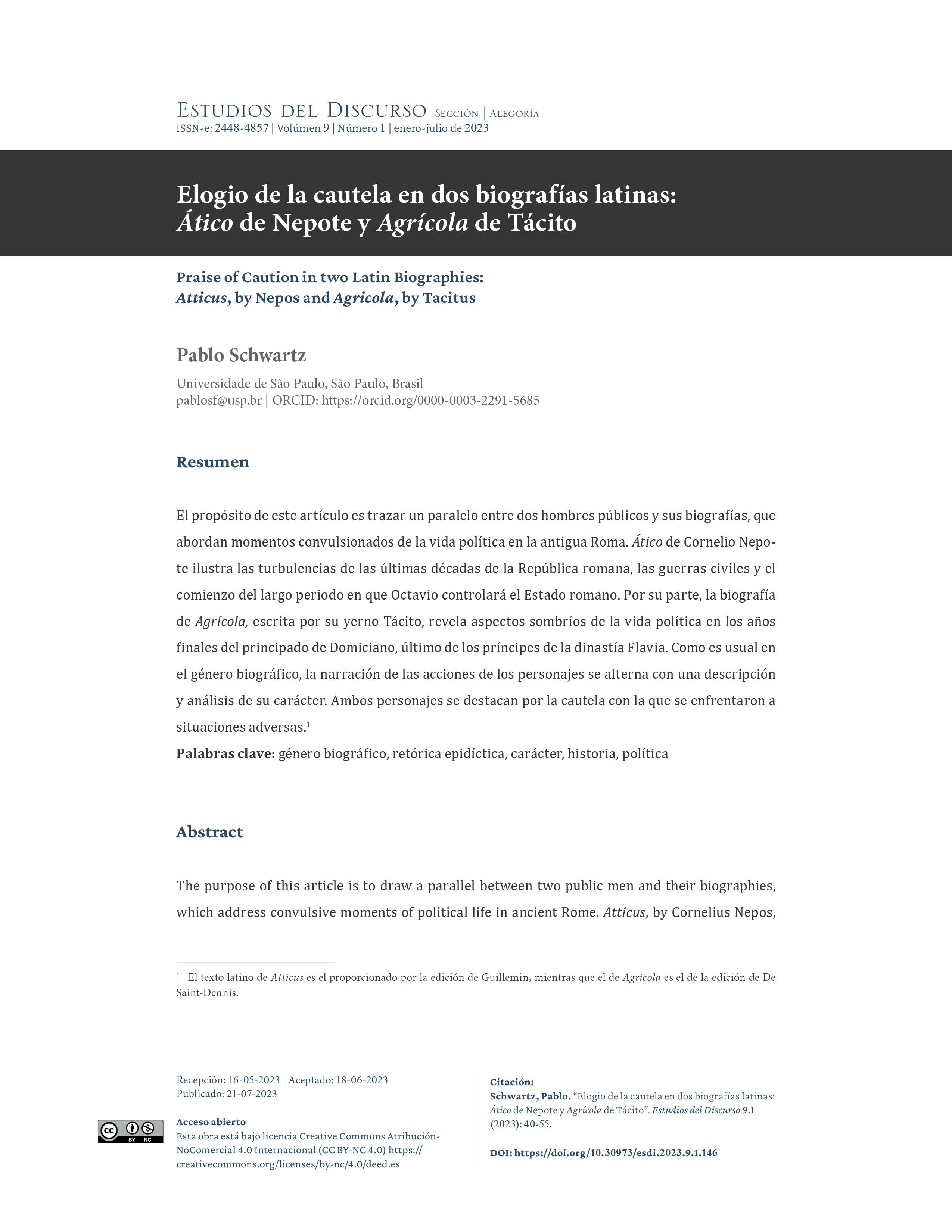Elogio de la cautela en dos biografías latinas: Ático de Nepote y Agrícola de Tácito.
DOI:
https://doi.org/10.30973/esdi.2023.9.1.146Palabras clave:
Género biográfico, retórica epidíctica, carácter, historia, políticaResumen
El propósito de este artículo es trazar un paralelo entre dos biografías de hombres públicos, que abordan momentos convulsionados de la vida política en la antigua Roma. Ático de Cornelio Nepote ilustra las turbulencias de las últimas décadas de la República romana, las guerras civiles y el comienzo del largo período en que Octavio controlará el Estado romano. Por su parte la biografía de Agrícola, escrita por su yerno Tácito, revela aspectos sombríos de la vida política en los años finales del principado de Domiciano, último de los príncipes de la dinastía Flavia. Como es usual en el género biográfico, la narración de las acciones de los personajes se alterna con una descripción y análisis de su carácter. Ambos personajes se destacan por la cautela con la que se enfrentaron a situaciones adversas[1].
[1] El texto latino de Atticus es el proporcionado por la edición de Guillemin, mientras que el de Agricola es el de la edición de De Saint-Dennis.
Descargas
Citas
Birley, A.R. “The Agricola”. In Woodman, A. J. (ed.). The Cambridge Companion to Tacitus. Cambridge: Cambridge University Press (2009): 47-58.
Courbaud, Edmund. (ed. y trad.). Cicéron. De l’orateur. Livre deuxième. Paris: Les Belles Lettres, 1966.
De Saint-Dennis, Eugène (ed. y trad.). Tacite. Vie d’Agricola. Paris: Les Belles Lettres, 1992.
Geiger, Joseph. “Cornelius Nepos and Ancient Political Biography”. Historia. Einzelschriften,47, 1985.
Goelzer, Henri (ed. y trad.). Tacite. Annales. Livre IV-XII. Paris: Les Belles Lettres, 1924.
Iso, José Javier (ed. y trad.). Cicerón. Sobre el orador. Madrid: Gredos, 2002.
Joly, F. D.; Faversani, F. “Tácito, sua Vida de Agrícola, e a competição aristocrática no alto império romano”. Mnemosine Revista, 4.1 (2013):133-147.
Lavan, Miles. “Slavishness in Britain and Rome in Tacitus’ Agricola”. The Classical Quarterly, 61.1. (2011): 294-305.
Le Bonniec, Henri; Wuilleumier, Pierre (eds. y trads.). Tacite. Histoires. Livre I. Paris: Les Belles Lettres, 2018.
Lobur, John Alexander. Cornelius Nepos. A Study in the Evidence and Influence. Ann Arbor: University of Michigan Press, 2021.
Guillemin, Anne-Marie (ed. y trad.) Cornélius Népos. Oeuvres. Paris: Les Belles Lettres, 1961.
Kennedy, George A. (ed. y trad.). Progymnasmata. Greek Textbooks of Prose Composition and Rhetoric. Atlanta: Society of Biblical Literature, 2003.
Martha, Jules (ed. y trad.). Cicéron. Brutus. Paris: Les Belles Lettres, 1923.
Pernot, Laurent. Epideictic Rhetoric. Questioning the Stakes of Ancient Praise. Austin: University of Texas Press, 2015.
Requejo, J. M. Cornelio Tácito. Agrícola. Germania. Diálogo sobre los oradores. Madrid: Gredos, 1988.
Russell, D. A; Wilson, N. G (eds. y trads.). Menander Rhetor. A Commentary. Oxford: Oxford University Press, 1981.
Scheid, John (ed.). Res Gestae Divi Augusti. Paris: Les Belles Lettres, 2007.
Segura Moreno, Manuel (ed. y trad.) Cornelio Nepote. Vidas. Madrid: Gredos, 1985.
Syme, Ronald. The Roman Revolution. Oxford: Oxford University Press, 2002 (1a ed. 1939).
Syme, Ronald. Tacitus. Oxford: Oxford University Press, 1997. 2v. (1a ed. 1958).
Vacher, Marie-Claude (ed. y trad.). Suétone. Grammairiens et Rhéteurs. Paris: Les Belles Lettres, 2003.
Webb, Ruth. “The progymnasmata as practice”. In: Yun Lee Too. Education in Greek and Roman Antiquity. Leiden: Brill, 2001.

Descargas
Publicado
Cómo citar
Número
Sección
Licencia
Derechos de autor 2023 Estudios del Discurso

Esta obra está bajo una licencia internacional Creative Commons Atribución-NoComercial 4.0.
La revista Estudios del Discurso está bajo una Licencia Creative Commons Atribución-NoComercial 4.0 Internacional, de tipo CC BY-NC, de modo que es posible compartir y adaptar el material, pero debe darse crédito a la obra de manera adecuada e indicar si se han realizado cambios; no puede hacerse uso del material con fines comerciales. Estudios del Discurso proporciona un acceso abierto inmediato a su contenido e investigaciones; se autoriza copiar, distribuir y comunicar públicamente cualquiera de los textos publicados, siempre que se cite de manera adecuada la fuente y se remita a la publicación original. Los autores tienen libertad de diseminar su trabajo y hacerlo disponible en otros lugares, siempre y cuando den crédito a la publicación original y, de ser posible, proporcione una liga directa a la misma. Esta revista no solicita cobro de tarifas hacia los autores para la evaluación o procesamiento de los artículos.

